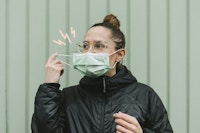Covid 19
Covid-19 stands for "Coronavirus disease 2019". The disease primarily affects the respiratory tract. In December 2019, an accumulation of cases of pneumonia was observed in the Chinese city of Wuhan.
The virus is now transmitted between people in the same way as a common cold or flu. This method of infection is called droplet and contact infection. What happens is that the virus from the respiratory tract of a sick person is transmitted via droplets in the air, via the hands, or via contaminated surfaces to other people.
Most of the infection probably occurs from patients with symptoms. However, there is also evidence of possible infectivity during the incubation period or from people who are infected but do not develop symptoms.
-
Symptoms
The most common symptoms of covid-19 are fever, fatigue and dry cough. It takes up to two weeks from the time of infection until symptoms occur, but usually five to six days (incubation period). There is great variation in symptoms and course. Some do not get symptoms at all, some get symptoms of mild or moderate respiratory infection, while others get more severe symptoms such as heavy breathing, shortness of breath and shock.
Four out of five people with covid-19 recover without the need for advanced treatment. Worldwide, about one in six people with covid-19 develops more serious illness with heavy breathing. Elderly people, people with concomitant other diseases (comorbidity) and people with weakened immune systems are most prone to complications.
-
What can I do myself?
The most important treatment is to isolate infected or suspected infected people, to prevent the spread of the virus.
Remember good hand and cough hygiene.
You and your loved ones can get along normally. Who "your closest" are you decide for yourself, but it should not be too many and it should be the same over time. Keep an increased distance from others than your loved ones.
Avoid physical contact, including handshakes and hugs.
There should be at least one meter between you. The distance from face to face is most important. If you stand back to back, or one after the other as in a queue, there is less risk of infection. Where you sit next to each other, it should be one meter from shoulder to shoulder.
Follow the travel recommendations from FHI.
If you get symptoms of a respiratory infection, stay home until you are symptom-free.
If you have symptoms of covid-19 you should be tested. FHI recommends that all people with symptoms of covid-19 be tested:- Anyone with an acute respiratory infection or other symptoms of covid-19
- Anyone who has been exposed to covid-19 infection, either as close contact or after traveling in a country or region with a high incidence in the last 10 days
- Other groups at the discretion of the physician
- Anyone who suspects that they are infected with covid-19 should have the opportunity to get tested
As of today, there is no specific treatment for the viral infection covid-19. The general treatment consists of a good fluid supply, oxygen if needed and possible use of a respirator in critically ill people.
-
What can Eyr help with?
- Eyr can assess whether there is a suspicion of Covid-19 disease and whether testing is necessary
- Eyr can explain the concepts of isolation and quarantine
- Eyr can help with sick leave in case of proven illness or quarantine.
- Eyr can provide advice and guidance on own treatment in the course of the disease and assess whether further assessment and treatment is relevant.
- Eyr can exercise a short support conversation and refer to a psychologist at a time when many are struggling with feelings of loneliness, home office and uncertainty about the future. We can also guide you further to testing and what kind of regulations apply at the moment as this is constantly changing.
Download Eyr on your mobile and book an appointment now
Have a video call with a doctor - when and where it suits you. Download the app and book a doctor's appointment or vaccine now.

Reference: Norwegian Medical Handbook, NEL Edited and medically quality assured by Dr. Theresa Franck, specialist in general medicine.
